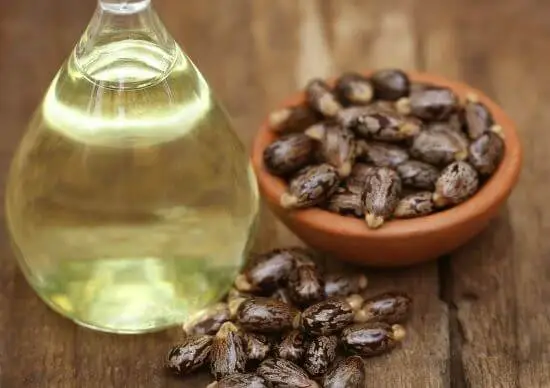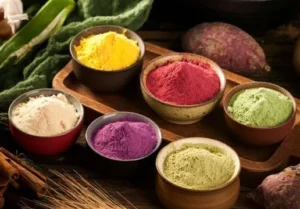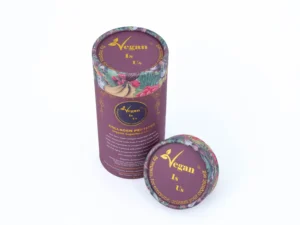Castor Oil for Hair: Benefits, Uses, Alternatives, and Side Effects
Castor oil has been a staple in beauty and wellness routines for centuries, revered for its myriad benefits, particularly for hair care. Extracted from the seeds of the Ricinus communis plant, castor oil is a thick, viscous liquid packed with essential nutrients that promote hair health. In recent years, castor oil has gained significant traction in the beauty industry, with many hailing it as a “miracle oil” for hair growth and scalp health. This comprehensive guide delves into the benefits, uses, alternatives, and potential side effects of castor oil for hair, providing you with all the information you need to incorporate this natural remedy into your hair care routine. Whether you’re looking for ways to encourage hair growth, improve scalp health, or add shine, castor oil for hair offers numerous advantages.
The Composition of Castor Oil
Before exploring the benefits of castor oil for hair, it’s essential to understand its composition. Castor oil is rich in:
- Ricinoleic Acid: This monounsaturated fatty acid makes up about 90% of castor oil and is known for its anti-inflammatory and antimicrobial properties.
- Omega-6 and Omega-9 Fatty Acids: These essential fatty acids nourish the hair and scalp, promoting healthy hair growth and reducing hair thinning.
- Vitamin E: A powerful antioxidant that helps protect hair from damage caused by free radicals and environmental stressors.
- Proteins: Essential for hair repair and growth, supporting overall hair health.
- Minerals: Such as zinc, magnesium, and calcium, which contribute to the vitality and strength of the hair.
These components work synergistically to provide a range of benefits for hair, from promoting growth to improving scalp health.
Benefits of Castor Oil for Hair
1. Promotes Hair Growth
One of the most celebrated benefits of castor oil is its ability to promote hair growth. The ricinoleic acid in castor oil helps improve blood circulation to the scalp, ensuring that hair follicles receive adequate nutrients. This, in turn, stimulates hair growth and can help reduce hair loss. Regular use of castor oil for hair growth can result in longer, thicker hair over time.
2. Moisturises and Conditions Hair
Castor oil is an excellent emollient, meaning it helps to lock in moisture. Its thick consistency forms a protective barrier around the hair shaft, preventing moisture loss and leaving hair feeling soft, hydrated, and nourished. This is particularly beneficial for those with dry, brittle, or damaged hair.
3. Strengthens Hair
The proteins and fatty acids in castor oil help to strengthen hair strands, reducing breakage and split ends. Regular use of castor oil can lead to thicker, more resilient hair, making it an excellent choice for anyone dealing with weak or thinning hair.
4. Improves Scalp Health
Castor oil’s antimicrobial and anti-inflammatory properties make it an effective treatment for various scalp conditions, such as dandruff, scalp acne, and fungal infections. A healthy scalp is crucial for healthy hair growth, and castor oil helps to maintain the scalp’s natural balance. The enhanced scalp health improves the environment for optimal hair growth.
5. Adds Shine and Lustre
The nourishing properties of castor oil can add a natural shine to your hair, making it look healthier and more vibrant. It smooths the hair cuticle, reflecting light and giving your hair a glossy appearance. If you’re searching for a natural way to boost hair shine, castor oil is an excellent option.
6. Prevents Hair Loss
By improving scalp health and strengthening hair follicles, castor oil can help reduce hair loss. It also helps to prevent hair thinning by nourishing the roots and promoting healthy hair growth. With regular use, castor oil may reduce hair thinning and prevent premature hair loss.
7. Natural Hair Thickener
For those with fine or thinning hair, castor oil can act as a natural thickener. Its ability to penetrate the hair shaft and nourish the hair from within can lead to fuller, thicker hair over time. Whether you’re looking to add volume or thickness, castor oil can help achieve these results naturally.
How to Use Castor Oil for Hair
1. As a Hair Mask
One of the most popular ways to use castor oil is as a hair mask. Here’s how you can do it:
- Step 1: Warm a few tablespoons of castor oil in a bowl. Warming the oil helps it penetrate the hair shaft more effectively.
- Step 2: Apply the oil to your scalp and hair, focusing on the roots and ends. Use your fingertips to massage the oil into your scalp, which will help improve blood circulation.
- Step 3: Cover your hair with a shower cap or towel and leave the mask on for at least 30 minutes, or overnight for deeper conditioning.
- Step 4: Wash your hair thoroughly with a mild shampoo to remove the oil. You may need to shampoo twice to ensure all the oil is removed.
2. As a Leave-In Treatment
For those with extremely dry or damaged hair, castor oil can be used as a leave-in treatment:
- Step 1: Apply a small amount of castor oil to the ends of your hair, avoiding the roots to prevent greasiness.
- Step 2: Style your hair as usual. The oil will help to seal in moisture and protect your hair from environmental damage.
3. As a Scalp Treatment
To improve scalp health and promote hair growth, you can use castor oil as a scalp treatment:
- Step 1: Mix a few drops of castor oil with a carrier oil, such as coconut oil or olive oil, to dilute it.
- Step 2: Apply the mixture to your scalp and massage it in using circular motions.
- Step 3: Leave the treatment on for at least 30 minutes before washing it out.
4. As a Hot Oil Treatment
A hot oil treatment can deeply condition your hair and scalp:
- Step 1: Heat a few tablespoons of castor oil in a bowl until it’s warm but not hot.
- Step 2: Apply the warm oil to your scalp and hair, massaging it in thoroughly.
- Step 3: Cover your hair with a shower cap and leave the treatment on for 30 minutes to an hour.
- Step 4: Rinse the oil out with warm water and shampoo as usual.
5. As a Styling Aid
Castor oil can also be used as a natural styling aid to tame frizz and add shine:
- Step 1: Take a small amount of castor oil and rub it between your palms.
- Step 2: Gently smooth the oil over your hair, focusing on the ends and any frizzy areas.
- Step 3: Style your hair as usual. The oil will help to keep your hair smooth and shiny throughout the day.
Alternatives to Castor Oil for Hair
While castor oil is a fantastic natural remedy for hair care, it may not be suitable for everyone. Some people may find it too heavy or greasy, while others may be allergic to it. Fortunately, there are several alternatives to castor oil that offer similar benefits:
1. Coconut Oil
Coconut oil is one of the most popular alternatives to castor oil. It is rich in fatty acids that nourish and moisturise the hair, promoting healthy growth and reducing protein loss. Coconut oil is lighter than castor oil, making it a better option for those with fine or oily hair.
2. Argan Oil
Argan oil, often referred to as “liquid gold,” is another excellent alternative. It is rich in vitamin E and fatty acids, which help to nourish and protect the hair. Argan oil is lighter than castor oil and is ideal for adding shine and reducing frizz.
3. Jojoba Oil
Jojoba oil closely resembles the natural oils produced by the scalp, making it an excellent choice for balancing oil production. It is lightweight and easily absorbed, making it suitable for all hair types. Jojoba oil helps to moisturise the hair and scalp, promoting healthy hair growth.
4. Olive Oil
Olive oil is another popular alternative to castor oil. It is rich in antioxidants and fatty acids that help to nourish and strengthen the hair. Olive oil is particularly beneficial for those with dry or damaged hair, as it helps to restore moisture and improve elasticity.
5. Almond Oil
Almond oil is rich in vitamins and minerals that promote hair health. It is lightweight and easily absorbed, making it suitable for all hair types. Almond oil helps to nourish the hair and scalp, promoting healthy growth and reducing hair loss.
6. Avocado Oil
Avocado oil is rich in vitamins A, D, and E, as well as fatty acids that help to nourish and moisturise the hair. It is particularly beneficial for those with dry or damaged hair, as it helps to restore moisture and improve elasticity.
7. Grapeseed Oil
Grapeseed oil is lightweight and easily absorbed, making it an excellent alternative to castor oil. It is rich in antioxidants and fatty acids that help to nourish and protect the hair. Grapeseed oil is particularly beneficial for those with oily hair, as it helps to balance oil production.
Potential Side Effects of Castor Oil for Hair
While castor oil is generally safe for most people, there are some potential side effects to be aware of:
1. Allergic Reactions
Some people may be allergic to castor oil, which can cause symptoms such as itching, redness, and swelling. If you experience any of these symptoms, discontinue use immediately and consult a healthcare professional.
2. Greasy Hair
Castor oil is thick and heavy, which can make hair feel greasy if too much is used. To avoid this, start with a small amount and gradually increase if needed. Be sure to wash your hair thoroughly after using castor oil to remove any excess oil.
3. Scalp Irritation
In some cases, castor oil can cause scalp irritation, particularly if used in large amounts or if the scalp is sensitive. To minimise the risk of irritation, dilute castor oil with a carrier oil before applying it to the scalp.
4. Hair Build-Up
Using castor oil too frequently or in large amounts can lead to build-up on the hair and scalp. This can make hair feel heavy and look dull. To prevent build-up, use castor oil in moderation and be sure to wash your hair thoroughly after each use.
5. Difficulty Washing Out
Due to its thick consistency, castor oil can be difficult to wash out of the hair. This can leave hair feeling greasy and weighed down. To ensure all the oil is removed, you may need to shampoo your hair twice or use a clarifying shampoo.
Summary
Castor oil is a versatile and powerful natural remedy for hair care, offering a range of benefits from promoting hair growth to improving scalp health. Its rich composition of fatty acids, vitamins, and minerals makes it an excellent choice for those looking to enhance their hair’s health and appearance. However, it’s essential to use castor oil in moderation and be aware of potential side effects, such as allergic reactions and scalp irritation.
For those who find castor oil too heavy or greasy, there are several alternatives available, including coconut oil, argan oil, and jojoba oil, each offering similar benefits for hair health. Ultimately, the best hair care routine is one that works for your unique hair type and needs. Whether you choose to use castor oil or an alternative, incorporating natural oils into your hair care routine can lead to healthier, more vibrant hair.
By understanding the benefits, uses, alternatives, and potential side effects of castor oil, you can make an informed decision about whether it’s the right choice for your hair care needs. With regular use and proper application, castor oil can help you achieve the luscious, healthy hair you’ve always desired.







